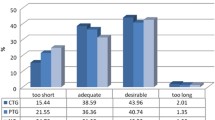Abstract
Men with erectile problems seen for a comprehensive urology-department-based medical and psychological evaluation were sent questionnaires 2 to 3 years later. A representative sample of 99 (52%) responded. The majority (51%) has taken no action and reported that their sexual function was no better. Patients were more likely to comply with a recommendation for sex therapy than with one for a penile prosthesis. This was related to their attitude towards mental health professionals. These findings suggest the need for more knowledge of patient psychology and expectations.
Similar content being viewed by others
References
Bancroft, J. (1983).Human Sexuality and its Problems Churchill-Livingstone, Edinburgh, Scotland.
DeGood, D. E. (1983). Reducing medical patients' reluctance to participate in psychological therapies: The initial session.Prof. Psychol. 14: 570–579.
Haynes, R. B., Taylor, W. D., and Sackett, D. L. (Eds.). (1979).Compliance in Health Care Johns Hopkins University Press, Baltimore.
Lief, H. I. (1981). (ed.)Sexual Problems in Medical Practice American Medical Association, Monroe, WI.
Melman, A., Kaplan, D., and Redfield, J. (1984). Evaluation of the first 70 patients in the center for male sexual dysfunction of Beth Israel Medical Center.J. Urol. 131: 53–55.
Munjack, D. J., and Oziel, L. J. (1980).Sexual Medicine and Counseling in Office Practice: A Comprehensive Treatment Guide Little Brown, Boston.
Segraves, R. T., Camic, P., and Ivanoff, J. (1985). Spontaneous remission in erectile dysfunction: A partial replication.Behav. Res. Ther. 23: 203–204.
Segraves, R. T., Knopf, J., and Camic, P. (1982). Spontaneous remission in erectile impotence.Behav. Res. Ther. 20: 89–91.
Segraves, R. T., Schoenberg, H. W., Zarins, C. K., Camic, P., and Knopf, J. (1981). Characteristics of erectile dysfunction as a function of medical care system entry point.Psychosom. Med. 43: 227–234.
Snyder, C. R., and Smith, T. W. (1982). Symptoms as self-handicapping strategies: The virtues of old wine in a new bottle. In Weary, G., and Mirels, H. L. (eds.),Integrations of Clinical and Social Psychology Oxford University Press, New York.
Tiefer, L. (1986). In pursuit of the perfect penis: The medicalization of male sexuality.Am. Behav. Sci. 29(5): 579–599.
Author information
Authors and Affiliations
Additional information
These data were presented in preliminary form at the Tenth Meeting of the International Academy of Sex Research, Cambridge, England, September 1984.
Rights and permissions
About this article
Cite this article
Tiefer, L., Melman, A. Adherence to recommendations and improvement over time in men with erectile dysfunction. Arch Sex Behav 16, 301–309 (1987). https://doi.org/10.1007/BF01542139
Issue Date:
DOI: https://doi.org/10.1007/BF01542139




